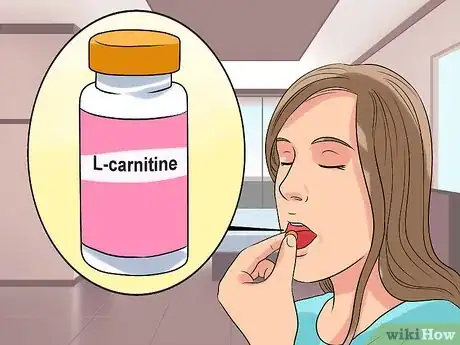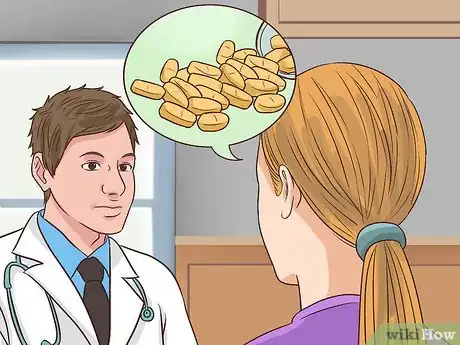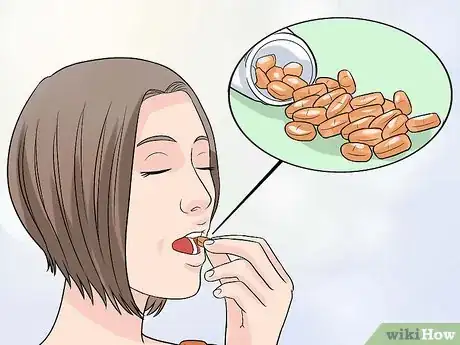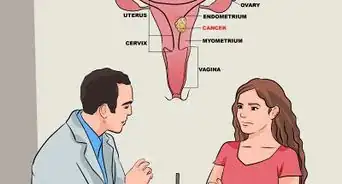This article was medically reviewed by Janice Litza, MD and by wikiHow staff writer, Megaera Lorenz, PhD. Dr. Litza is a board certified Family Medicine Physician in Wisconsin. She is a practicing Physician and taught as a Clinical Professor for 13 years, after receiving her MD from the University of Wisconsin-Madison School of Medicine and Public Health in 1998.
There are 26 references cited in this article, which can be found at the bottom of the page.
This article has been viewed 24,836 times.
Polycystic ovary syndrome, or PCOS, is a hormonal disorder that can interfere with ovulation in some women. If you have PCOS and are having difficulty getting pregnant, you can improve your chances by taking measures to improve the quality of your eggs. Start by consulting with your OB-GYN or fertility specialist to determine the best approach for improving your egg quality. You can also help your body produce healthy eggs by adopting a healthy lifestyle.
Steps
Getting Medical Treatment to Improve Your Egg Quality
-
1Let your doctor know that you want to improve your egg quality. Make an appointment with your primary care doctor, OB-GYN, or fertility specialist, and work with them to develop a strategy that works best for you. Your doctor’s advice may vary depending on your age, overall health, lifestyle, and any methods you are already using to improve your fertility and manage your PCOS.[1]
- Your doctor will probably ask for a complete list of all medications and supplements you are currently taking.
- They may also do lab work, such as blood tests or an ultrasound, to evaluate the health of your eggs and help them decide which treatments might benefit you the most.
- Your doctor may recommend lifestyle changes, dietary supplements, medications, or a combination of approaches to improve your egg quality.
-
2Ask about using Coenzyme Q10 supplements. Coenzyme Q10, or CoQ10, is an antioxidant that has been shown to improve egg quality and ovarian health. CoQ10 occurs naturally in the human body, but levels tend to drop off as you age. Taking CoQ10 supplements may help some women with PCOS conceive successfully.[2] Ask your doctor if CoQ10 supplements are a good option for you.
- Ask your doctor about how much CoQ10 to take. Typical therapeutic doses range between 200 and 600 mg daily.[3]
- Don’t take CoQ10 without consulting with your doctor first. It can interact poorly with certain medications, such as blood pressure medications, blood thinners, and some types of beta-blockers and chemotherapy medications.
- CoQ10 may lower your blood sugar. If you have diabetes, talk to your doctor about whether it is safe for you to take CoQ10.
- CoQ10 side effects are rare and typically mild. The most common side effect is an upset stomach.
Advertisement -
3Look into combining L-carnitine with clomiphene. L-carnitine is an antioxidant that occurs naturally in the body. When combined with the fertility drug clomiphene, L-carnitine supplements can improve the quality of your ovulation and increase your chances of conceiving.[4] This combination may be even more effective when combined with omega-3 fatty acids, like those found in fish oil supplements. Clomiphene is typically given in 50 mg doses once a day for 5 days.[5] Your doctor may recommend combining it with 3 g of L-carnitine daily.
- Clomiphene can cause serious side effects, and may increase your risk of developing ovarian cancer. Talk to your doctor about the risks of taking clomiphene, and tell them about any other medications or supplements you are taking.[6]
- Clomiphene side effects include upset stomach and vomiting, headache, vaginal bleeding, breast tenderness, and feeling unusually warm. If you experience rare side effects like disrupted vision (blurring, double vision, or seeing spots), stomach pain and swelling, weight gain, or shortness of breath, see your doctor immediately.[7]
- Talk to your doctor before taking clomiphene if you have a history of liver disease, ovarian cysts (caused by conditions other than PCOS), uterine fibroids, abnormal vaginal bleeding, thyroid disease, pituitary tumors, or adrenal disease.[8]
- L-carnitine is unlikely to cause serious side effects, but you should still tell your doctor about your health history and any other medications or supplements before taking it. L-carnitine may interact poorly with blood thinners or thyroid replacement medications.
- L-carnitine side effects include diarrhea (usually only at doses of 5 g or more daily), or more rarely, rash, body odor, or increased appetite. Tell your doctor before taking L-carnitine if you have a history of high blood pressure, cirrhosis, diabetes, kidney disease, seizures, or peripheral vascular disease.
-
4Discuss using N-acetyl-cysteine. N-acetyl-cysteine, or NAC, is an antioxidant that may help some women with PCOS conceive successfully.[9] It may be even more effective when combined with folic acid. While NAC is relatively safe, it can cause serious side effects in some people, and may interact with certain medications, such as nitroglycerin.[10] Talk to your doctor before starting NAC supplements, and follow their dosage directions carefully.
- Ask your doctor how much NAC to take. They may recommend around 600 mg daily.[11]
- Possible side effects of NAC include upset stomach, diarrhea, nausea and vomiting, tiredness, eye irritation, or skin rashes. If you experience rare or serious side effects such as low blood pressure, asthma, headache, or anaphylactic shock, see your doctor immediately.[12]
- Talk to your doctor before taking NAC if you have a history of acute asthma.[13]
-
5Check with your doctor about taking DHEA. DHEA is a hormone that occurs naturally in the human body. While DHEA is usually sold as an anti-aging supplement, it can also help boost the health of your eggs and ovaries.[14] However, DHEA should be used with caution, as it can cause serious side effects and is known to interact badly with a variety of medications. PCOS can cause your body to produce an excess of natural DHEA, so your doctor may not recommend DHEA supplements for you.
- For treating infertility, the typical dosage of DHEA is 75 mg daily, split into 3 doses of 25 mg each.[15]
- DHEA can cause a wide variety of side effects, including low blood pressure, upset stomach, fatigue, respiratory distress, chest pain, dizziness, blood in the urine, emotional changes (such as anxiety or mania), headache, weight gain, or rashes. It may cause hormonal symptoms in women, such as changes in breast or genital size, abnormal or irregular periods, acne, or increased hair growth.[16]
- Talk to your doctor before taking DHEA if you have a history of prostate, liver, breast, or ovarian cancer, urinary tract infections, thyroid disorders, diabetes, heart disease, stroke, low good cholesterol levels, high triglycerides, bleeding disorders, sweating disorders, joint pain, immune disorders, or psychiatric or emotional disorders (such as anxiety, depression, bipolar disorder, PTSD, or a sleep disorder).[17]
- Tell your doctor about any other medications or supplements you are taking before you start taking DHEA. DHEA is incompatible with several medications, including some types of antipsychotics and antidepressants, certain anti-seizure medications, and hormonal medications containing estrogen or testosterone.[18]
- DHEA may increase your risk of developing certain types of cancers. It can also lower your levels of good cholesterol.[19]
- Do not take DHEA if you are breastfeeding or pregnant.[20]
-
6Choose supplements that are third-party certified. Since the FDA does not regulate dietary supplements, it is important to purchase supplements made by a reputable brand. Look for supplements that have been approved by an organization like USP, NSF International, or Consumer Lab. Third-party verification information should be printed on the label.[21]
- Some good supplements do not go through third-party certification. You can find these by searching reviews done by Consumer Lab. You can also look for a pharmacy with a trained pharmacist who can advise you about herbal medicine and supplements.
-
7Use caution when trying Chinese herbal medicine. While Chinese herbal medicine, or CHM, is a popular method for improving egg health, it’s unclear how safe or effective it really is. Some studies show that it can help some women conceive successfully.[22] Others have found that there is little evidence that it is helpful for women with PCOS, although it might be somewhat more effective if combined with fertility medications like clomiphene.[23]
- If you decide to try CHM, talk to a physician who specializes in integrative medicine. Tell them about any other medications or supplements you are taking so that you can reduce the risk of harmful interactions.
Making Lifestyle Changes
-
1Do some low-stress exercise. Getting enough physical activity increases your overall health, which in turn can help you produce healthier eggs.[24] If you have PCOS, it’s important to exercise without overdoing it, since stressing your body too much can throw off your hormone balance and affect your reproductive health.[25] Ask your doctor to recommend a dietitian or personal trainer who has experience helping women with PCOS, and work with them to develop an exercise regimen that’s right for you.
- Start with low-impact exercises like yoga, walking, light jogging, swimming, and strength training.
- Always talk to your doctor before starting a new exercise regimen.
-
2Eat a balanced diet. When you’re trying to improve your egg health, getting the right nutrition is important. Instead of focusing on losing weight or cutting food groups like carbs or fats, prioritize getting all the nutrients your body needs.[26] Since every woman with PCOS has different dietary needs, talk to your doctor or a registered dietitian to determine the best diet for you. A balanced diet should include:
- Leafy green vegetables, like spinach and kale.
- Fresh, whole fruit.
- Foods containing complex carbohydrates, such as whole grains, peas, and beans.
- High-quality proteins, like those found in legumes (beans, peas, and lentils), nuts, and seeds, as well as animal proteins like fish, chicken breast, and eggs.
- Foods high in healthy fats, such as nuts and avocado.
-
3Try an anti-inflammatory diet. An anti-inflammatory diet may improve fertility and help reduce some symptoms of PCOS. This diet is designed to help you digest food and absorb nutrients better. Talk to your doctor or a dietitian before starting any special diet so that you can ensure that you are getting all the nutrients you need.[27] The main elements of the anti-inflammatory diet are:
- Lean proteins, such as chicken, turkey, grass-fed beef, low-mercury fish (like salmon, cod, tilapia, and catfish), nuts, and seeds.
- High-fiber, nutrient-rich vegetables and fruits, such as sweet potatoes, broccoli, cabbage, berries, and citrus fruits.
- Whole grains, such as brown rice, quinoa, and bulgur wheat.
- Anti-inflammatory spices, such as turmeric, cinnamon, black pepper, garlic, and ginger.[28]
-
4Avoid junk food. Foods that are high in trans fats, refined carbohydrates, sugar, and salt can stress your body, mess with your blood sugar levels, and disrupt your gut function. All of these things can make your PCOS symptoms worse and possibly impact the health of your eggs.[29] Cut back on processed, prepackaged foods and sugary or salty snacks. It’s especially important to avoid trans fats, since these have been shown to negatively impact fertility.[30]
-
5Cut out tobacco. Tobacco damages your whole body, including your ovaries and eggs. The toxins that you inhale when you smoke can damage and kill egg cells, and may eventually deplete your egg supply altogether, leading to early menopause.[31] If you smoke, talk to your doctor about the best way to quit.
-
6Limit your alcohol and caffeine intake. Alcohol and caffeine can both decrease fertility in women, and these effects may become even more severe when you use them together. Some fertility specialists recommend avoiding alcohol and caffeine completely when you are trying to conceive.[32]
- If you are dependent on alcohol or caffeine, talk to your doctor about the best way to cut back or quit.
-
7Talk to your partner about improving his sperm quality. If you are trying to conceive with the sperm of a male partner, he can contribute by keeping his sperm as healthy as possible. Your partner can keep his sperm in good shape by making a few healthy lifestyle choices, such as:[33]
- Eating a diet rich in antioxidants.
- Engaging in moderate exercise.
- Avoiding tobacco and alcohol.
- Using safety precautions when working with toxins, such as lead or pesticides.
- Getting tested and treated for any sexually transmitted infections.
Warnings
- Always consult your physician before taking any dietary supplements, starting a new exercise program, or significantly changing your diet.⧼thumbs_response⧽
References
- ↑ https://www.betterhealth.vic.gov.au/health/conditionsandtreatments/polycystic-ovarian-syndrome-pcos
- ↑ https://pubmed.ncbi.nlm.nih.gov/24813752/
- ↑ http://www.pcosnutrition.com/coenzymeq10/
- ↑ https://www.ncbi.nlm.nih.gov/pubmed/25015747
- ↑ https://www.drugs.com/dosage/clomiphene.html
- ↑ https://medlineplus.gov/druginfo/meds/a682704.html
- ↑ https://medlineplus.gov/druginfo/meds/a682704.html
- ↑ https://medlineplus.gov/druginfo/meds/a682704.html
- ↑ https://www.ncbi.nlm.nih.gov/pmc/articles/PMC4306416/
- ↑ https://www.mskcc.org/cancer-care/integrative-medicine/herbs/n-acetylcysteine
- ↑ https://reference.medscape.com/drug/n-acetylcysteine-mucomyst-acetylcysteine-343425
- ↑ https://www.mskcc.org/cancer-care/integrative-medicine/herbs/n-acetylcysteine
- ↑ https://reference.medscape.com/drug/n-acetylcysteine-mucomyst-acetylcysteine-343425#5
- ↑ https://www.ncbi.nlm.nih.gov/pmc/articles/PMC4534532/
- ↑ https://www.ncbi.nlm.nih.gov/pmc/articles/PMC3800538/
- ↑ https://www.mountsinai.org/health-library/supplement/dehydroepiandrosterone
- ↑ https://www.mountsinai.org/health-library/supplement/dehydroepiandrosterone
- ↑ https://www.mayoclinic.org/drugs-supplements-dhea/art-20364199?pg=2
- ↑ https://www.mayoclinic.org/drugs-supplements-dhea/art-20364199?pg=2
- ↑ https://www.mayoclinic.org/drugs-supplements-dhea/art-20364199?pg=2
- ↑ https://www.today.com/money/which-vitamins-herbal-supplements-can-you-trust-t491
- ↑ https://www.ncbi.nlm.nih.gov/pubmed/25637159
- ↑ https://www.ncbi.nlm.nih.gov/pubmed/27731904
- ↑ https://www.tommys.org/pregnancy-information/planning-a-pregnancy/are-you-ready-to-conceive/being-active-when-trying-conceive
- ↑ https://www.ncbi.nlm.nih.gov/pubmed/11431132
- ↑ https://www.ncbi.nlm.nih.gov/pmc/articles/PMC3717046/
- ↑ https://www.rrc.com/anti-inflammatory-diets-may-help-fertility/
- ↑ https://health.usnews.com/wellness/food/articles/2017-07-07/8-anti-inflammatory-spices-for-easing-arthritis
- ↑ https://nutritionfacts.org/video/best-foods-for-polycystic-ovary-syndrome-pcos/
- ↑ https://www.ncbi.nlm.nih.gov/pmc/articles/PMC3717046/
- ↑ https://www.womenshealth.gov/menopause/early-or-premature-menopause
- ↑ https://www.fertilitysociety.com.au/wp-content/uploads/FSA-Effects-of-caffeine-alcohol-and-smoking-on-fertility-2016.pdf
- ↑ https://www.mayoclinic.org/healthy-lifestyle/getting-pregnant/in-depth/fertility/art-20047584?pg=2




















-Step-11.webp)



















































Medical Disclaimer
The content of this article is not intended to be a substitute for professional medical advice, examination, diagnosis, or treatment. You should always contact your doctor or other qualified healthcare professional before starting, changing, or stopping any kind of health treatment.
Read More...